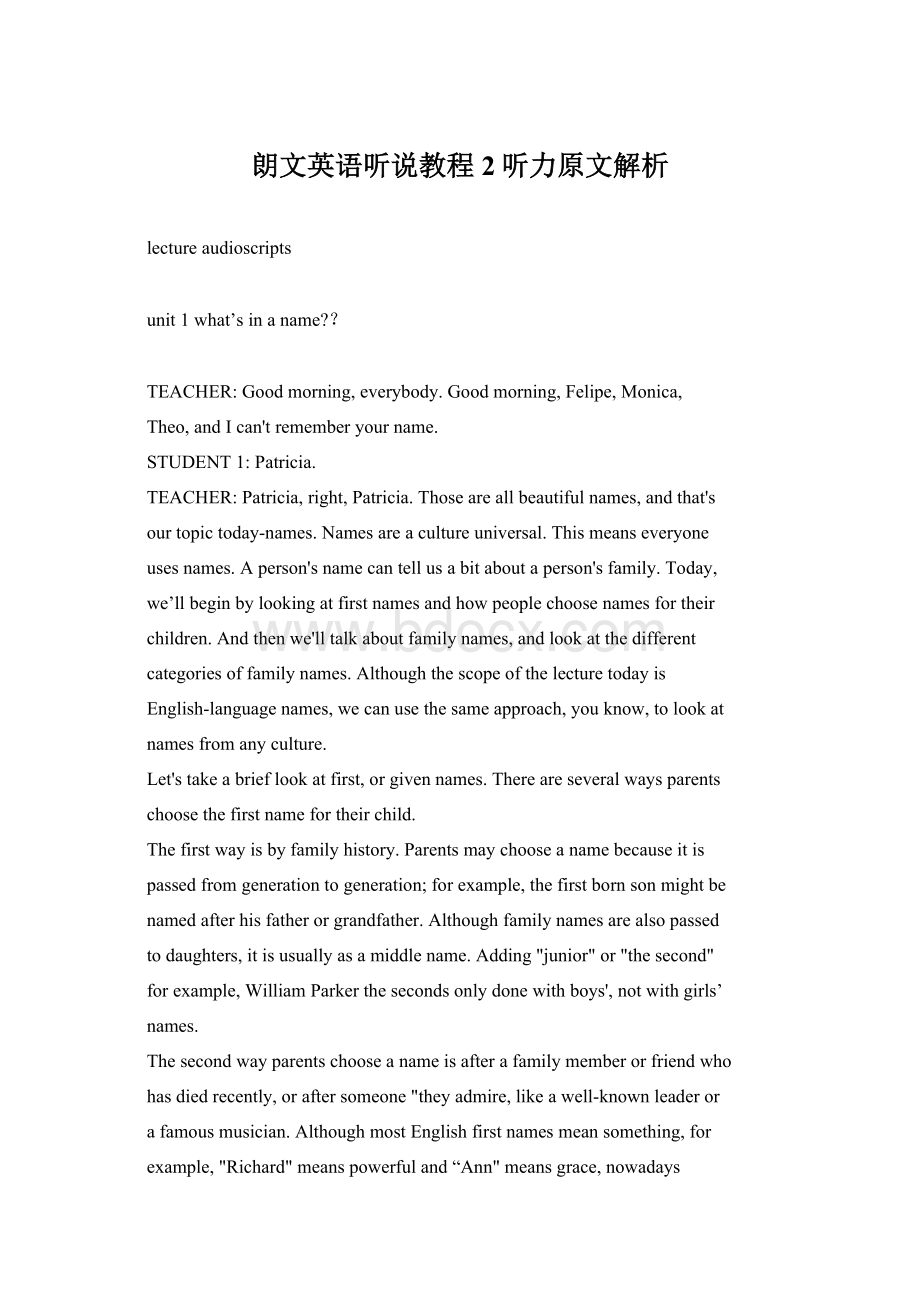朗文英语听说教程2听力原文解析文档格式.docx
《朗文英语听说教程2听力原文解析文档格式.docx》由会员分享,可在线阅读,更多相关《朗文英语听说教程2听力原文解析文档格式.docx(22页珍藏版)》请在冰豆网上搜索。

categoriesoffamilynames.Althoughthescopeofthelecturetodayis
English-languagenames,wecanusethesameapproach,youknow,tolookat
namesfromanyculture.
Let'
stakeabrieflookatfirst,orgivennames.Thereareseveralwaysparents
choosethefirstnamefortheirchild.
Thefirstwayisbyfamilyhistory.Parentsmaychooseanamebecauseitis
passedfromgenerationtogeneration;
forexample,thefirstbornsonmightbe
namedafterhisfatherorgrandfather.Althoughfamilynamesarealsopassed
todaughters,itisusuallyasamiddlename.Adding"
junior"
or"
thesecond"
forexample,WilliamParkerthesecondsonlydonewithboys'
notwithgirls’
names.
Thesecondwayparentschooseanameisafterafamilymemberorfriendwho
hasdiedrecently,oraftersomeone"
theyadmire,likeawell-knownleaderor
afamousmusician.AlthoughmostEnglishfirstnamesmeansomething,for
example,"
Richard"
meanspowerfuland“Ann"
meansgrace,nowadays
meaningisnotthemainreasonpeopleselecttheirbaby'
sname.
Thethirdwayistoprovidea"
push"
forthechild.Parentswanttochoosea
namethatsoundsvery"
successful."
Astrongnamemighthelptheminthe
businessworld,forexample.Ortheymightchooseanamethatworksfor
eithergender,likeTaylororTerry.So,giventhesethreemethods,whatisthe
mostcommonwayparentschooseaname?
Manyparentschooseaname
simplybecausetheylikeit,orbecauseit'
sfashionableorclassic.Fashionsin
nameschangejustastheydoinclothes.Onehundredyearsago,manynames
camefromtheBiblenamessuchasDaniel,andAnna,andHannahand
Matthew.Thenfiftyyearsago,Biblicalnameswentoutoffashion.Nowadays,
namesfromtheBiblearebecomingpopularagain.
Similarly,parentsoftenchooseclassicnames,namesthatwerepopularin
1900,1950,andarestillpopularnow.ClassicnamesforboysincludeThomas,
David,Robert,andMichael.Andforgirls:
Anna,Elizabeth,Emily,and
Katherine,justtonameafew.They'
reclassic.Theynevergooutofstyle.
slookattheoriginoflastnames,alsocalledfamilynamesorsurnames.
Researchershavestudiedthousandsoflastnames,andthey'
vedividedthem
intofourcategories.Thecategoriesare:
placenames,patronymics,added
names,andoccupationalnames.Arecentsurveyshowedthatofthe7,000
mostpopularnamesintheUnitedStatestoday,43percentwereplacenames,
32percentwerepatronymics,15percentwereoccupationalnames,and9
percentwereaddednames.
Thefirstcategoryisplacenames.Placenamesusuallyidentifiedwherea
personlivedorworked.SomeonenamedJohnHilllivednearahill,for
example,andtheRiversfamilylivednearariver.IfyouhearthenameEmma
Bridges,whatimagedoyousee?
Doyouseeafamilythatlivesnearabridge?
Ifyoudo,yougettheidea.
Thesecondcategoryispatronymics.That'
sP-A-T-R-O-N-Y-M-I-C-S.A
patronymicisthefather’sname,plusanendinglikeS-E-NorS-O-N.The
endingmeansthatachild,aboy,isthesonofhisfather.ThenamesRobertson,
Petersen,andWilsonarepatronymics.RobertsonissonofRobert,Petersenis
sonofPeter,andsoon.
Thethirdcategoryisaddednames.Linguistssometimescallthiscategory
"
nicknames,"
butwhenmostofusheartheword"
nickname,"
wethinkofa
specialnameafriendoraparentmightuse.Theword"
nickname"
isactually
anoldEnglishwordthatmeansanadditionalname,anaddedname.SoI'
ll
usetheterm"
addedname."
Thiscategoryoflastnamesisfunbecausethe
namesusuallydescribedaperson.Reed,Baldwin,andBiggsareexamples.
Reedwasfrom"
red"
forredhair.Baldwinwassomeonewhowasbald,
someonewhohadlittleornohair.AndBiggs.
STUDENT2:
Someonebig?
Yeah,someonebig,right.Now,ifwelookaroundtheroom,we
couldprobablycomeupwithsomenewlastnames,like,uh.CurlyorStrong.
Now,thefourthcategoryisoccupationalnames.Theoriginofthefamily
namewastheperson'
soccupation.Themostcommonexamplesof
occupationalnamesstillusedtodayareBaker(someonewhobakesbread).
Tailor(someonewhosewsclothes).Miller(someonewhomakesflourfor
bread),andSmith....Now,Smithisactuallythemostcommonnameinthe
westernEnglish-speakingworld.ThenamecomesfromanOldEnglishword,
smite,that'
sS-M-I-T-E,whichmeanstohitorstrike.Intheolddays,asmith
mademetalthingsfordailylife,liketools.Everytownneededsmiths.What'
interestingisthatmanylanguageshaveafamilynamethatmeansSmith.In
ArabicitisHaddad,H-A-D-D-A-D.InSpanishitisHerrera,H-E-R-R-E-R-
A.InItalianitisFerraro,F-E-R-R-A-R-O.AndinGermanitisSchmidt,
spelledS-C-H-M-I-D-T.Allthesenamesmeansmith.
Thoughnamesmaytellussomethingaboutsomeone'
sfamilyhistory,you
needtokeepinmindthattheymaynottellusmuchatallaboutthepresent.
Forexample,there'
susuallynotmuchconnectionbetweentheoriginofthe
nameandthepersonwhohasitnow.TakethenameCook,forinstance.A
personnamedCooktodayprobablydoesn'
tcookforaliving.Also,many
peoplechangetheirnamesforvariousreasons.Lotsofpeoplewhohave
movedtotheUnitedStateshavechangedtheirnamestosoundmoreAmerican.
Thishappenslessnowthaninthepast,butpeoplestilldoit.Peoplealsouse
pennamesorstagenamestogivethemselvesaprofessionaladvantage.For
example,thewriterSamuelClemensusedthepennameMarkTwain,and
ThomasMapotherIVusesthestagenameTomCruisey.
So,let'
srecapnow.Intoday’slesson,welookedathowparentschoose
Englishfirstnames.Wealsolookedatsomecommonoriginsoffamilynames.
Inthenextclass,we'
lllookathownamesaregiveninKoreaandinJapan.
Thisiscoveredinthenextsectionofthebook.That’sallfortoday.
Unit2English:
AGlobalLanguage?
Today’stopicisEnglishasagloballanguage.Iknowmanyof
youspeakEnglishasasecondlanguage,right?
Howaboutyou,Hiroshi?
Is
Englishyourfirstlanguage?
No,myfirstlanguageisJapanese.Englishismysecond
language.
Andhowaboutyou,Patricia?
Englishismysecondlanguage,too.Myfirstlanguageis
Spanish.
See,manyofyouuseEnglishasasecondlanguage,evenasa
globallanguagetocommunicatewithotherpeoplewhospeakEnglishasa
secondlanguage.Today,Iwanttogiveyoutwocontrastingpointsofviewon
whetherornotEnglishisagloballanguage.ThefirstisthatEnglishis
obviouslyagloballanguage.Peoplewhosupportthispointofviewbelieve
Englishisthelanguagepeopleallovertheworldusetocommunicate,and
thatitisgraduallyreplacingotherlanguages.Thesecondpointofviewisthat
Englishisnottrulyagloballanguagebecauseitisnotthemainlanguage
spokenbypeopleworldwide.Supportersofthisviewsaythatthoughmany
peoplespeaksomeEnglishworldwide,Englishhasnotreplacedother
languages.TheyacknowledgethatpeopleuseEnglisheveryday,formany
reasons,butthisdoesn'
tmeanEnglishisreplacingotherlanguages,nordoes
itmakeEnglishthemainlanguagespokenintheworld.
First,let'
sexaminethefirstview.Firstofall,Englishisthedominantlanguage
ofbusiness,travel,andscience.Whenpeopleneedacommonlanguage,they
oftenuseEnglish.Thinkaboutit.Englishisoftenusedattouristinformation
centers,ininternationalhotels.IfyouuseataxiinRome,andyoucan'
tspeak
Italian,thetaxidriverismorelikelytouseEnglishthananyotherlanguages.
Itisuseatbusinessmeetingsandinternationalsportsevents.TheEuropean
UnionusesEnglish,alongwithFrench,atitsmeetings….ASEANtheAsian
tradegroup,usesEnglishatitsmeetings.Canyouthinkofothersituationsin
whichEnglishisusedascommonlanguage?
Howaboutthisclass?
AllofinthePhilippines,Singapore,and
Indian.
Absolutely.Educationalsettingsareagreatexample.Any
others?
Howaboutachatroomonsometimesgotochatroomsand
everyoneisusingEnglish.
Excellentexample.TheInternethascreatedalotof
communitiesandpeopleoftenuseEnglish.Infact,mostpeoplewhousethe
InternetknowEnglish.ThishelpssupporttheviewthatEnglishisaglobal
ThesecondmajorreasonthatpeoplebelieveEnglishisagloballanguageis
thatitistheofficiallanguageofmorethanseventy-fivecountries.Thismeans
thesecountriesuseEnglishinschools,banks,business,andgovernment.Of
theseseventy-fivecountries,Englishmaybetheonlyofficiallanguageofthe
country,likeinEngland,orEnglishmaybeusedalongwithotherofficial
languages,likeinthePhilippines,Singapore,andIndia.IncountrieslikeIndia,
wheresomanylanguagesarespoken,youcanseehowusingEnglishasan
officiallanguagemakesiteasierforpeopletocommunicate.
Thethirdreasontosupporttheglobalargumentisthateveryyearabout1
billionpeoplestudyEnglish.Why?
Whataresomeofthereasons?
Hiroshi?
Howaboutyou?
Well,nowtostudy,andsomedayIwanttobeininternational
business.
That'
sasolidreason.Howaboutyou,Oksana?
STUDENT